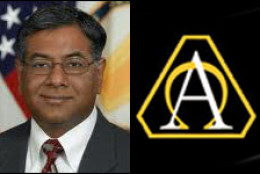Cybersecurity
-
Rep. Gerry Connolly (D-Va.) discusses what progress Congress can realistically make on the budget. Anthony Amendolia of the DLA talks turkey -- as in, the thousands of turkeys he ordered for service members overseas. Alex Bolton, senior writer for The Hill, discusses Congress' strategies to avoid the fiscal cliff. GAO's Steve Lord reviews TSA's complaint process.
November 21, 2012 -
Tom Sisti, director and legislative counsel for SAP, joins host Roger Waldron to talk about a wide range of acquisition issues. November 20, 2012
November 20, 2012 -
A group of former federal cybersecurity experts and professionals have made recommendations for improving federal cybersecurity guidance, such as the Office of Management and Budget's Circular A-130.
November 19, 2012 -
Export-Import Bank President Fred Hochberg explains why his agency had a banner year, with a record number of transactions in fiscal 2012. And a professor at the Wharton School describes how private insurance companies are making money off the National Flood Insurance Program — but taxpayers are likely to pick up the slack when claims surpass premiums.
November 16, 2012 -
The Republican leader said today on the Senate floor that after the debates over the DoD and Intelligence authorization bills, lawmakers could address concerns about the Cybersecurity Act of 2012.
November 15, 2012 -
The upper chamber fails to move cyber bill out of starting blocks by receiving 60 votes to end cloture. Lawmakers couldn't get past their concerns over the requirement for regulations and DHS' oversight role.
November 15, 2012 -
NSA, DHS taking steps to improve information sharing by creating a set of standardized technical specifications that let machines detect cyber threats and communicate them to one another in real-time. Whole of government approach is starting to take shape when it comes to cybersecurity.
November 08, 2012 -
Po Collins of the National Contract Management Association talks ethics. Don Kettl, dean of the school of Public Policy, University of Maryland, sheds light on the election. Craig Karch of ICE talks about the return of antiquities to Mexico. Alexander Bolton of The Hill newspaper and J.David Cox, national president of AFGE, call in about the election.
November 07, 2012 -
The Consortium for Cybersecurity Action, a newly-formed international group of government agencies and private organizations from around the world, today will release an updated baseline of the 20 most important cyber controls. The group wants to become a resource to help agencies implement those security checks. DHS already is developing a solicitation to make it easier for agencies to buy tools and services to implement several of the security checks.
November 05, 2012 -
Justice IG Michael Horowitz shares findings about what happens to illegal immigrants before they go to immigration court. Plus, how are postal employees faring on the East Coast after superstorm Sandy?
November 02, 2012 -
Thousands of IRS computers could be prone to cyber intruders because officials aren't updating software in a timely manner, according to a report from the Treasury Inspector General for Tax Administration.
November 01, 2012 -
Terry Edwards, the director of the Office of the Chief Systems Engineer and chief information officer for the assistant secretary for acquisition, logistics and technology, said his office helps acquire technology and ensure standards are met. November 1, 2012(Encore presentation December 27, 2012)
November 01, 2012 -
EPA's 25,000 email users will be fully migrated to the cloud by early 2013 thanks to collaboration solutions provided by Lockheed Martin and Microsoft.
November 01, 2012 -
Senate version of the cyber legislation includes a provision to let the Homeland Security Department take specific steps to be more competitive in hiring cyber workers. Secretary Janet Napolitano said DHS is in the midst of hiring hundreds, but could use many more.
October 31, 2012 -
The 18-month study found DoD is no longer the employer of choice for STEM workers, at a time it should be attracting a "high fraction of the highest-quality STEM workforce."
October 31, 2012




